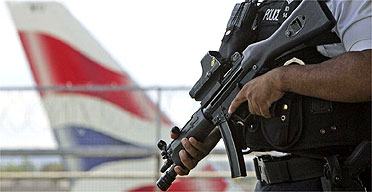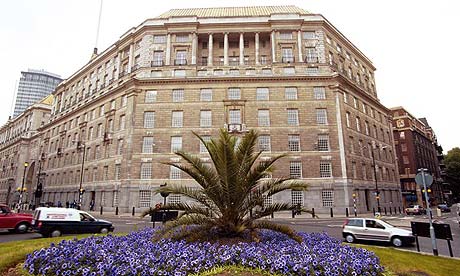Gordon Brown moved yesterday to dominate the terror and security agenda, grabbing a Tory proposal for an integrated single border force and then challenging David Cameron to accept that the scale of the terrorist threat requires an extension of detention without charge to up to 56 days.
The move, announced in a ground-breaking Commons statement, follows months of discussions with police and security services on a range of measures, including post-charge questioning of suspects, the use of intercept evidence in court and a proposal that convicted terrorists be treated in the same way as sex offenders.
The scale of the proposals also holds political dangers for Mr Brown since they could damage his rapprochment with liberal Britain, started when he launched his package of constitutional measures in his first week as prime minister.
But Mr Brown insisted: "Liberty is the first and founding value of our country. Security is the first duty of our government."
The sweeping package of proposals unveiled by Mr Brown took in a £70m commitment to tackle extremism, with lessons on citizenship in Britain's 1,000 madrasas as part of a "hearts and minds" strategy to support Muslim community groups.
He revealed that police and the security services are tracking 2,000 individuals, an increase of 400 in the past nine months. A total of 900 shopping centres, sports stadiums and other areas where large crowds gather have been assessed by counter-terrorism advisers.
At the heart of the package was the announcement that the government would commit to a new unified border force to protect ports and airports, an idea championed by both opposition parties and persistently rejected as unworkable by the government.
Mr Brown spoke of a new "highly visible" uniformed border force, which would "strengthen the powers and surveillance of capability of our border guards and security officers" by bringing together the borders and immigration agency, Customs and the UK visas overseas operation. However, Conservative and Liberal Democrat opponents noted that it would not include the police. Nick Clegg, of the Liberal Democrats, dubbed it "border force lite".
The commitment to revisit the controversial detention without charge issue comes after police outlined the way big terrorism cases against one or two suspects can involve the time-consuming investigation of 200 phones, 400 computers, 8,000 CDs, 6,000 gigabytes of data and 70 premises across three continents. But human rights lawyers, some Muslim organisations and civil rights groups expressed disappointment that Mr Brown had decided to reopen the issue of detention without charge less than two years after Tony Blair's plans for 90-day detention were thrown out by the Commons.
Mr Blair was defeated by 33 votes in 2005; in a sign that Mr Brown is moving cautiously, he did not personally commit himself to 56 days yesterday, stressing that he was holding a consultation on up to 56 days. Shami Chakrabarti, director of Liberty, complained: "Lengthy periods of detention without charge failed in Northern Ireland and are counterproductive to providing intelligence for the police".
Amnesty likened the measures to internment.
Mr Cameron also refused to accept Mr Brown's claim that recent terrorist cases had demonstrated that police need more time to investigate detainees in complex international cases.
Sir Menzies Campbell, the Lib Dem leader, also refused to give ground: "We know that it is in the nature of the police to ask for more powers - for the best of motives but often for the worst of reasons. It is in the nature of government to grant such powers, and it should be in the nature of parliament to resist them."
David Winnick, who led the Labour rebellion in 2005, said: "Consensus was found on 28 days, so we should be hesitant about taking the controversial steps that divided the house nearly two years ago."
Privately, leading Labour rebels believe the backbench mood is wavering and 56 days will get through the Commons, but struggle in the Lords.
Mr Brown's surprise announcement of a unified border force follows a seven-year party political argument over border control. The effect will be seen next month, with travellers being greeted by uniformed officers staffing a "single primary checkpoint" for passport control and Customs.
Mr Brown made clear to MPs that this development was only the most visible aspect of the changes involved in accelerating Britain's "e-borders" programme with more checks of advance passenger lists on flights to Britain to enforce a "no-fly" policy for potential terrorists. The single force will lead to greater coordination, a common set of objectives, a common set of powers and a single command structure, the government said. A cabinet office review, to be led by Sir Gus O'Donnell, the cabinet secretary, will look at including the police in the force at a later date.
The package also includes new powers for MI5 to obtain information from other government agencies, tighter bail conditions of those suspected of lesser terror offences, a terrorist offender register and new powers to enter the properties of those under control orders.







